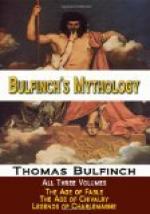And Arthur took a golden comb, and scissors whereof the loops were of silver, and he combed his hair. And Arthur inquired of him who he was; “for my heart warms unto thee, and I know that thou art come of my blood. Tell me, therefore, who thou art.” “I will tell thee,” said the youth. “I am Kilwich, the son of Kilydd, the son of Prince Kelyddon, by Goleudyd, my mother, the daughter of Prince Anlawd.” “That is true,” said Arthur; “thou art my cousin. Whatsoever boon thou mayest ask, thou shalt receive, be it what it may that thy tongue shall name.” “Pledge the truth of Heaven and the faith of thy kingdom thereof.” “I pledge it thee gladly.” “I crave of thee, then, that thou obtain for me Olwen, the daughter of Yspadaden Penkawr, to wife; and this boon I likewise seek at the hands of thy warriors. I seek it from Kay and from Bedwyr; and from Gwynn, the son of Nudd, and Gadwy, the son of Geraint, and Prince Flewddur Flam and Iona, king of France, and Sel, the son of Selgi, and Taliesin, the chief of the bards, and Geraint, the son of Erbin, Garanwyn, the son of Kay, and Amren, the son of Bedwyr, Ol, the son of Olwyd, Bedwin, the bishop, Guenever, the chief lady, and Guenhywach, her sister, Morved, the daughter of Urien, and Gwenlian Deg, the majestic maiden, Creiddylad, [Footnote: Creiddylad is no other than Shakspeare’s Cordelia, whose father, King Lear, is by the Welsh authorities called indiscriminately Llyr or Lludd. All the old chronicles give the story of her devotion to her aged parent, but none of them seem to have been aware that she is destined to remain with him till the day of doom, whilst Gwyn ap Nudd, the king of the fairies, and Gwythyr op Greidiol, fight for her every first of May, and whichever of them may be fortunate enough to be the conqueror at that time will obtain her as a bride.] the daughter of Lludd, the constant maiden, and Ewaedah, the daughter of Kynvelyn, [Footnote: The Welsh have a fable on the subject of the half man, taken to be illustrative of the force of habit. In this allegory Arthur is supposed to be met by a sprite, who appears at first in a small and indistinct form, but who, on approaching nearer, increases in size, and, assuming the semblance of half a man, endeavors to provoke the king to wrestle. Despising his weakness, and considering that he should gain no credit by the encounter, Arthur refuses to do so, and delays the contest until at length the half man (Habit) becomes so strong that it requires his utmost efforts to overcome him.] the half-man.” All these did Kilwich, the son of Kilydd, adjure to obtain his boon.
Then said Arthur, “O chieftain, I have never heard of the maiden of whom thou speakest, nor of her kindred, but I will gladly send messengers in search of her. Give me time to seek her.” And the youth said, “I will willingly grant from this night to that at the end of the year to do so.” Then Arthur sent messengers to every land within his dominions to seek for the maiden, and




